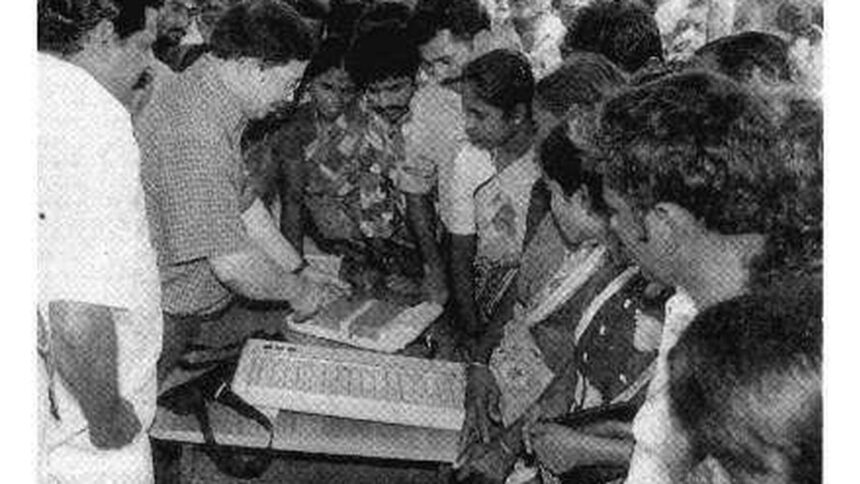[ad_1]

The then Chief Electoral Officer, Mrutyanjay Sarangi, explaining the working of an EVM to eager farmers at the Uzhavar Sandhai in Tiruchi on April 11, 2001.
| Photo Credit: The Hindu Archives
The story so far: On February 21, 2001, the All India Anna Dravida Munnetra Kazhagam (AIADMK) filed a writ petition in the Madras High Court to prohibit the Election Commission of India (ECI) from using Electronic Voting Machines (EVMs) in the Legislative Assembly election due in the State that year. Subsequently, one M. Haneefa, claiming to be a manufacturer of electronic equipment, filed a writ petition to declare Section 61A (permitting the use of voting machines in elections) of the Representation of the People Act, 1951 as ultra vires the Constitution. It was followed by a series of writ petitions by All India Forward Bloc (Tamil Nadu), AIADMK, Pattali Makkal Katchi (PMK), and Communist Party of India (CPI) questioning the vires of Section 61A. A few more writ petitions were also filed by PMK, CPI, and Indian National League with a plea to to direct the ECI to forbear from using EVMs in the 2001 elections in Tamil Nadu and Puducherry.
All the writ petitions were clubbed together and heard by the then first Division Bench comprising Chief Justice N.K. Jain and K. Sampath. After hearing elaborate arguments, the Division Bench dismissed all the writ petititions and upheld the constitutional validity of Section 61A which was introduced by the Parliament in 1989 with the specific intention of empowering the ECI to use machines, instead of ballot papers, for recording votes.
What did the petitioners argue?
The petitioners had contended that the manner of voting had been prescribed to be way of ballot in Section 59 of the 1951 Act and therefore, such a provision could not be overridden by Section 61A which empowers the ECI to use voting machines, be it electronic or otherwise, in any constituency as it may deem fit. It was argued that the Parliament had abdicated its responsibility by delegating excessive powers on the ECI with respect to the use of votimg machines. They contended that Section 61A was absolutely silent about preservation of contents in the EVMs so that they could be retrieved in case of filing of election petitions.
Interestingly, an argument was also put forth before the Division Bench that unlike the ballot boxes. made of thick iron sheets, the EVMs were fragile instruments with buttons meant for feather touch operations. It was argued that any bad element could damage the machines easily. It was also claimed that a voter and a polling officer could connive with each other to cast more than one vote in the EVMs. A question was raised as to what was the guarantee that the pressing of a particular button would ensure a vote only to the party to which the voter intended to cast his/her vote. Apprehensions regarding virus attacks, hacking and intentional damage to the machines by a voter were also put forth before the court.
How did the ECI respond to the petitioner’s arguments?
The ECI told the court that it had used EVMs for the first time in 50 polling stations in Paravur Assembly constituency in Kerala in 1982 but a Constitution Bench of the Supreme Court (in A.C. Jose versus Sivan Pillai and others) set aside that election in 1984 since there was no provision in the 1951 Act for the use of voting machines. Subsequently, on the recommendation of the ECI, the Parliament introduced Section 61A after amending the Act in 1989. In March 1990, the Commission procured 1.5 lakh from Electronics Corporation of India Limited (ECIL) at a cost of ₹73.5 crore. It also referred the matter to the electoral reforms committee known as Dinesh Goswami committee which, in turn, appointed a technical expert committee consisting of distinguished scientists to examine the machines minutely from all technical angles and submit its recommendations.
The technical committee was satisfied with the performance of the machines and accordingly, the ECI conducted meetings with registered political parties in December 1995 and May 1997 before taking a decision to introduce the EVMs across the country in a phased manner. The machines could not be used in the 1998 general elections due to paucity of time. However, in November 1998, they were used in the Assembly elections in Madhya Pradesh, Rajasthan and Delhi. The ECI also said that it had engaged the services of Centre for Study of Developing Socieities to study the use of EVMs in the 1999 by elections in Madhya Pradesh and Delhi. The study revealed that 87.7% voters were aware of the use of EVMs and 90.6% were in favour using EVMs instead of ballot papers. Therefore, the ECI had gone ahead and purchased 1.3 lakh more EVMs, at a cost of ₹150 crore, from ECIL and Bharat Electronics Limited (BEL) for their use during the 2001 elections.
Officials incharge of counting unlock an EVM machine to start the counting process at Presidency College premises in Chennai on April 15, 2001.
| Photo Credit:
The Hindu Archives
Stating that not even a single complaint of smashing/damaging/tampering of EVM had been reported so far, the ECI told the court that the memory of EVMs can remain intact without being erased for 10 years and that it would not be possible for a voter to cast more than one vote.
“The microchip, which is the brain of the whole system, can never be replaced. The programme is written independently in the assembly language of the microprocessor by the two public sector corporations ECIL and BEL and fused on the microprocessor chip at the facility of the chip manufacturer Hitachi Corporation, Japan. Once fused, the instructions cannot be altered or overwritten by anyone including the persons writing the programme. This is commonly known as firmware. Int he case of EVMs, the microprocessor chip is soldered directly on the printed circuit motherboard. Since the distances between the contacts are too small to be handled even by highly skilled workers, the actual placement is done using machines with in-built robotic arms and contact leads are wave soldered on to the motherboard. It is infeasible for the chip to be replaced through a manual process,” the ECI submitted before the court.
Court’s verdict
After hearing both sides, the High Court rejected the arguments regarding arbitrariness, abdication of responsibility by the Parliament, excessive delegation of powers on the ECI and lack of guidelines to uphold the constitutional validity of Section 61A. The Bench pointed out that after the introduction of Section 61A of the Act, the Conduct of Election Rules, 1961 too had been amended accordingly listing out the procedures to be followed while using the EVMs.
“We have no hesitation to hold that there is no abdication of powers. No excessive delegation can be traced out. Parliament has given sufficient powers to the Election Commission and it has been used in just, fair and proper manner. We are also of the view that no arbitrariness is shown and there is no absence of guidelines in the introduction of Section 61A as stated above. So, we find no good reason to declare that Section 61A is ultra vires. We answer the question raised at the beginning in the negative,” the Division Bench concluded.
Was the judgement taken on appeal?
The AIADMK took the High Court’s verdict on appeal to the Supreme Court. However, on April 23, 2001, a two-judge Bench comprising Justices B.N. Kirpal and Ruma Pal dismissed the special leave petition after observing that the 1984 Constitution Bench verdict in A.C. Jose’s case would not apply to the challenge made against Section 61A.
“In A.C. Jose’s case, it was by an executive order that the EVMs were sought to be used… Now that Section 61A has been inserted in the Representation of the People Act, 1951, in 1989, the aforesaid decision cannot be of any assistance to the petitioner. While considering the validity of the said Section, we are in agreement with the decision of the [Madras] High Court that the said Section is valid. The special leave petitions are dismissed,” the apex court concluded.
[ad_2]
Source link







